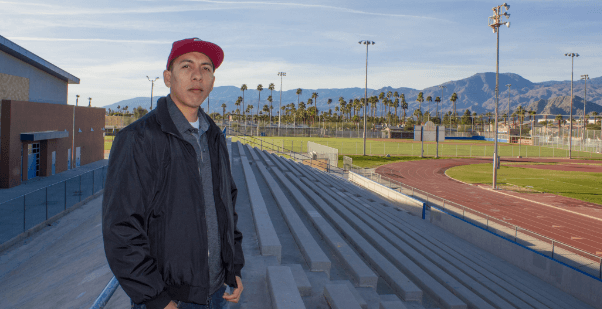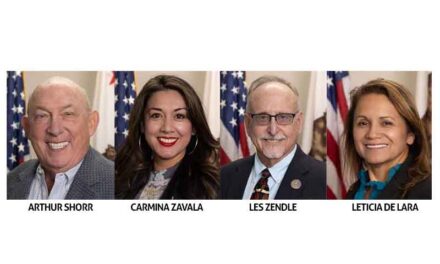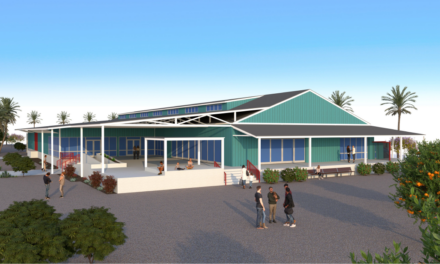INDIO – A 28-year-old man, Oscar Ortiz, who grew up in District 4 is seeking a four-year term on the City Council to represent his beloved childhood area.
It is a part of the community he believes does not receive the support it needs from the Indio City Council.
Oscar F. Ortiz, an Indio High School graduate and 2012 graduate of Stanford University, has filed a Candidate Intention Statement, indicating he will make a bid in District 4, according to City Clerk Administrator Sabdi Sanchez. Ortiz, if he qualifies as a candidate, will challenge Troy M. Strange who was elected to the City Council in 2014. Strange is currently serving as mayor pro tem.
Neither has yet qualified an official candidate, according to Sanchez.
“When I came back home about a year and a half ago, I noticed that a lot of times we didn’t really have very good representation for our low-income community, our youth or our small businesses,” Ortiz told Uken Report. “I kept hearing from the small businesses that they don’t have much backup from the city. So those are the three groups that I’m really focusing on through my campaign.”
His fundraising efforts, Ortiz said, are confined primarily to his district so he plans to spend about $10,000 on his campaign, more if donations exceed his expectations.
Some 17,611 residents live in District 4; 79 percent are Hispanic, according to city records. Twenty-nine percent of those in District 4 make less than $25,000; 28 percent make between $25,000 and $50,000.
Last year, people packed the Indio City Council Chambers asking the City Council for sanctuary city status, Ortiz was among them. That is when he took note of his likely opponent, Strange.
“I don’t think he really spoke up for our immigrant community when we were in the conversation about sanctuary cities,” Ortiz said of Strange. “I also don’t think that the entire City Council came up with any regulations for our cannabis industry in Indio. Now we’re missing out on a lot of revenue that Coachella and Cathedral City are getting. I think we could have come up with a safe way to bring that business into Indio.”
Now that California is a Sanctuary State, Ortiz said he no longer sees himself pushing for that in Indio.
With the dawn of 2018, California became a sanctuary state when a bill that Democratic Gov. Jerry Brown signed into law in October officially took effect.
The law prohibits police in the nation’s most populous state from asking people about their immigration status or participating in federal immigration enforcement activities in most cases,
The Golden State is home to an estimated 2.3 million illegal immigrants.
“Having sanctuary status is important because there are a lot of human rights issues involved with our immigration system,” Ortiz said. “I know that it’s not just violent criminals that are going into the system. For us to be sending working families that are undocumented to prison is not right. There are a lot of documented human rights violations. It’s very dangerous to me.”
Affordable housing is a top priority for Ortiz.
“We need to make sure that the people that we already have in Indio have options for housing that we can afford,” Ortiz said. “Half of our population makes under $50,000 a year for one home, and a lot of our population lives in multi-family homes. We should be building housing that they can afford so they will stay in Indio.”
Twenty-eight percent of the people in District 4 reside in multi-family homes, according to city documents.
His second priority is youth. He wants to find innovative and creative ways to help youth learn new business strategies … I think if kids know how to navigate the government here in the United States and how to navigate a business, we’re going to be a lot better off in the future.
After graduating in 2012, Ortiz worked in pharmaceutical quality control for a biopharmaceutical company and then for UCLA. He has also worked in the medical cannabis industry for four years, according to his site.
He moved back Indio in 2017 and began working as a substitute teacher.
In District 2, Waymond C. Fermon, a liberal Indio native, announced in January he would take on Michael H. Wilson, a conservative, who is currently serving a rotation as mayor. Fermon lived outside the district when he announced that he would run. He has since relocated to District 2.
Wilson is currently the only person who is qualified to be on the November ballot, Sanchez said.
To date, no one has publicly announced a challenge to Elaine Holmes in District 3. Nomination papers can officially be filed through Aug. 10.
This will be the first election for Indio since moving from at-large elections to district elections. Indio didn’t voluntarily move to districts, and the community didn’t want district-based voting, Wilson has said. It, like Cathedral City and Palm Springs, were forced into or face litigation. The goal is to get more Latinos to seek office.
The last day to register to vote is Oct. 22.
In order to be eligible to vote in California, an individual must be a United States citizen, a resident of California, and 18 years of age or older on Election Day. In order to vote in a City of Indio election, an individual must be registered to vote at an address in Indio.
For eligibility to vote in the November 6, 2018 general election, voter registrations must be postmarked or submitted electronically no later than October 22, 2018.
Verify your voter registration status: Visit here or call Riverside County Elections at (951) 486-7200.
Register or update your voter registration: Visit here. Paper voter registration forms are available at Riverside County elections office, local libraries, Department of Motor Vehicles offices, and US Post Offices.







